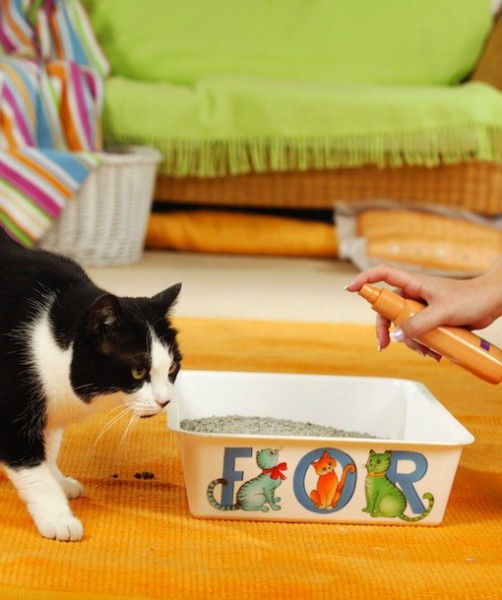
Cats are the world's most popular companion animals, and no doubt this reputation is enhanced by the fact that they are fastidious self-groomers who pride themselves on their neat and clean appearance. If there are any unpleasant whiffs in the home, they are probably related to the litter box. And that, dear pet parent, is your job to maintain. As the saying goes, "Dogs have owners; cats have staff."
Here are some helpful tips to ensure the litter box can be seen, not smelled.
1. Change Litter Type

The type of litter you use can play a very important role in odor control. The rule is one litter box per cat in the household. So you can test litters by using different brands and textures in different boxes and assess how they work in masking odors. Clay-based clumping litters often have better odor blockers than the more eco-friendly litters, such as those made from newspapers.
While many litters of all varieties do have built-in odor eliminators that include baking soda, along with some new formulations on the market, it's important to remember that cats typically don't like strongly scented litters and this could result in their staying clear of the litter box altogether! So read labels and look for odor blockers that are, in fact, odorless.
2. Use Litter Deodorizers
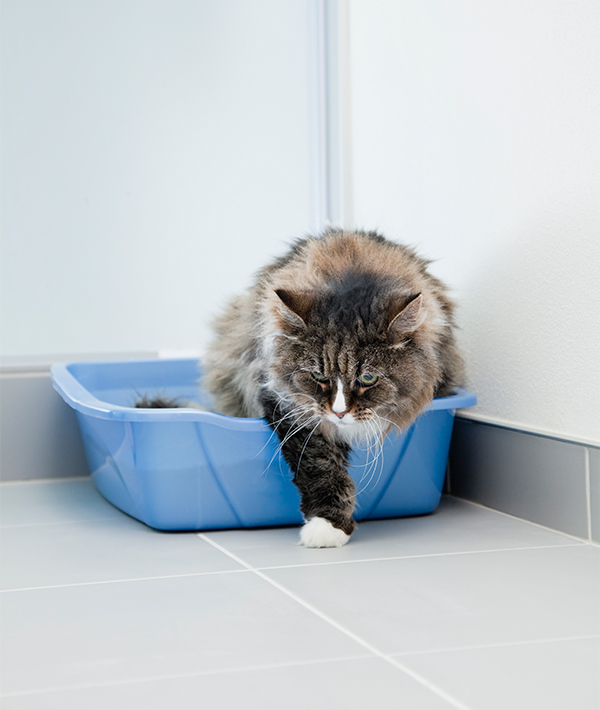
If the litter your cat prefers doesn't offer the best odor control, consider trying a litter deodorizer that can be either sprinkled or sprayed on to the litter itself and refreshed on a daily basis or when needed. Kitchen baking soda is non-toxic and a firm feline favorite. However, there are many new products on the market that are available in both pet supermarkets and in the home care aisle of major retailers.
MORE: 11 Cats in Onesies
3. Find The Right Air Freshener

When looking for an air freshener for use in the home, including the rooms where litter boxes are located, look for products that are non-toxic and that work to destroy odor molecules rather than simply masking them. Anything that masks an odor will wear off and the smell will be back! There are a slew of new products available that work by bonding with odor molecules and changing their molecular structure — thus efficiently destroying the smell completely. Products specially designed to combat pet odors should also be non-toxic. So once again read labels. Non-toxic air fresheners are available from pet stores and health stores. They are also an excellent choice for people suffering from asthma and respiratory conditions. So, it's a win-win.
4. Pick an Open Location For the Litter Box
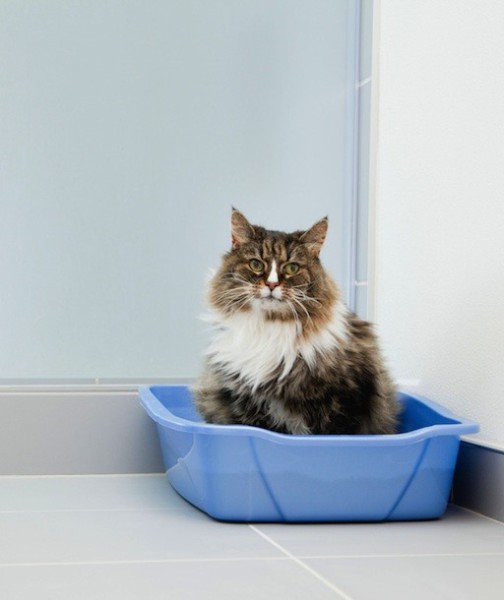
While litter boxes should be located away from high traffic zones in a household, they should also be placed in well-ventilated locations. Under stair cupboards and small utility rooms with little ventilation will only exacerbate the odor problem. Small confined spaces also make it more difficult for the cat to use. Also, if you have more than one box, place them in different locations in the home. This works from an odor control point of view and also in multi-cat households where cats tend to ambush one another. Cats consider litter boxes lined up next to one another as one "big box" and can tend to try and control the area. So, give your cats litter box options.
5. Scoop on a Daily Basis

One of the main reasons why a litter box smells is because the cat owner is not scooping often enough. Litter boxes must be scooped daily, and if you are really diligent, twice a day, every day! There are new gadgets on the market that will allowed eliminated matter to be placed in them and stored up to a week or two at a time (depending how many cats you are scooping up after). The gadgets are designed to lock the odors inside until they are ready to be emptied. They are ideal for apartment dwellers that don't want to lug bags of cat elimination to the general garbage shoots every day.
MORE: Friendliest Cat Breeds
6. Try Carbon Litter Box Liners
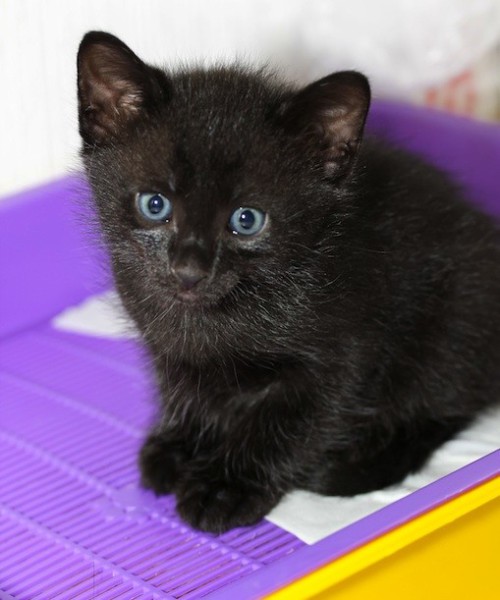
Carbon litter box liners are another way of combating the odor problem. These liners look like sheets of fine sandpaper and are placed in the bottom of the litter box. If you choose a plastic liner, they will also help prevent it being torn when your cat scratches and digs in the box. They should be replaced every three to four weeks. They are available in pet supermarkets, as well in the pet aisle in stores such as Target and Walmart. There are also litter boxes that have special slots for carbon filters or have a carbon filter system built into the design.
7. Use Air Purifiers or Humidifiers
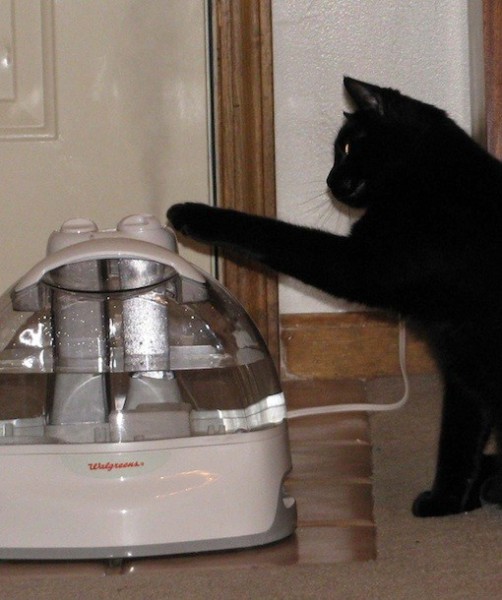
Air purifiers and humidifiers will not only improve the air quality in your home but will also go a long way to eliminating all kinds of odors in the household, including those emanating from the litter box. There are special air purifiers ostensibly designed for pet kennels and grooming salons. But they can be certainly used in a domestic environment, too.
8. Eliminate Closed Litter Boxes
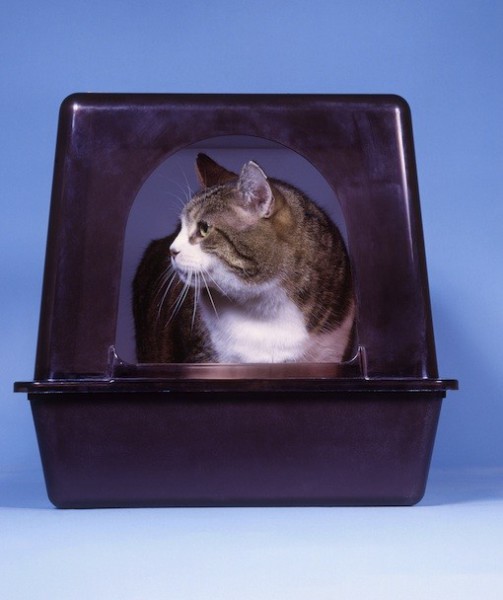
While many people consider a closed litter box a way of isolating odors by confining them to the box itself, its important to remember that as a rule, behaviorists do not recommend closed boxes for cats for a number of reasons. Primarily, in a multiple cat household, where there is feline rivalry and tension, a cat using a closed box may find itself ambushed and held hostage inside by other members of the feline household. From a practical standpoint, many of the boxes may look big but the actual interior pan area is way too small for big cats to turn around in comfortably. Also, sometimes the design makes the entry point too high for elderly cats to access easily. Take all these points into consideration when shopping for litter boxes for your own feline family members.
9. Change Your Cat's Diet
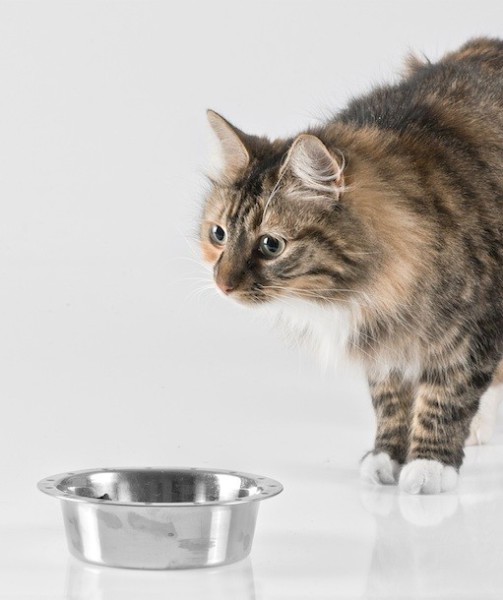
You know the maxim: "You are what you eat." It certainly applies to our pets, too. And, when it comes to cats, their diet can directly affect both the odor as well as the amount of urine and feces that get expelled into the litter box. It's important to try and buy the best food that you can afford. Your pet's nutrition is not where you should be trying to cut costs. Good nutrition promotes overall health and well-being. But in the short term, it has a direct effect on the litter box, too. Cheaper foods are often bulked up with fillers, by-products and ingredients that cats are either allergic to or find harder to digest. The result is smelly odor, as well as more fecal matter landing in the litter box. these points into consideration when shopping for litter boxes for your own feline family members.
10. Use Cat Wipes
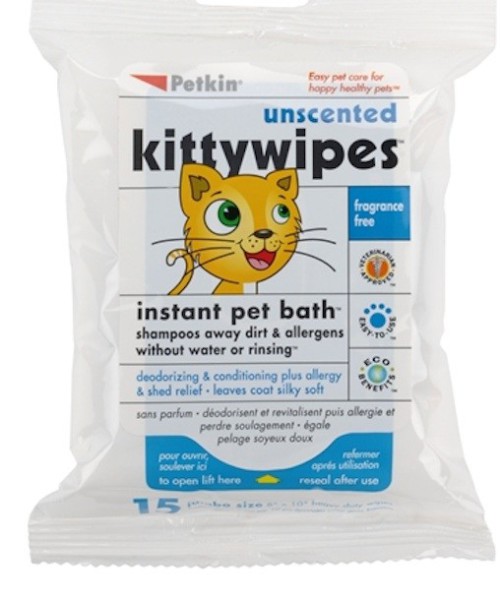
Cats don't usually have smelly fur because they are such fastidious self-groomers. However, skin infections with yeast or bacteria can lead to an unpleasant odor; often accompanied by hair loss, itching or visibly red and inflamed skin, infections should be treated by a veterinarian. It's important to remember smelly fur could also be an internal medical issue with outward signs. Once again, it's a good idea to seek a medical opinion.
However, in a household where there are cats and dogs that like to not only play together but sleep together, too, your cat's fur could pick up odors from the dog, if he's not being groomed regularly. There are special cat wipes formulated with the correct Ph factor for feline skin, that are also hypoallergenic and non-toxic and can be used on a regular basis to wipe down fur. They are also excellent for removing general dust and detritus from the fur, too.



